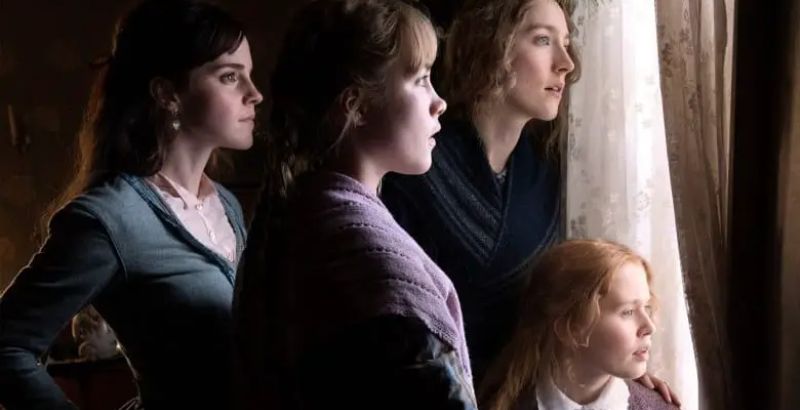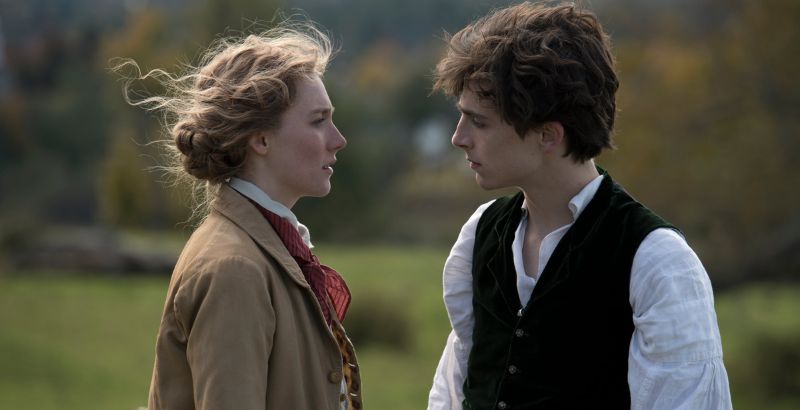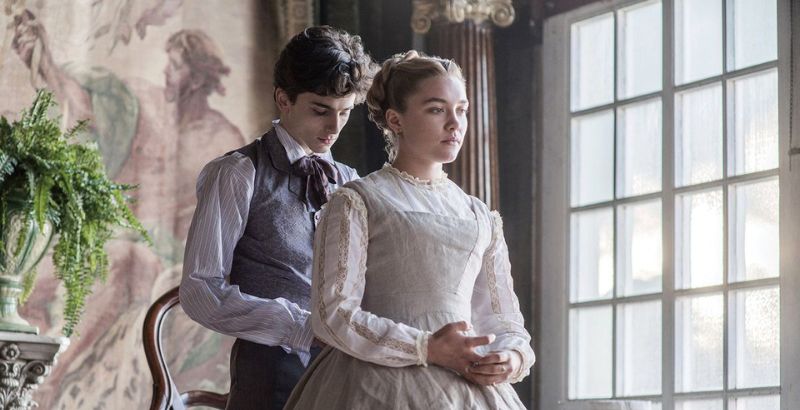
Adapting books into film is hard, but adapting books that have rooted themselves in classic literary canon is even harder. The latter is difficult for multiple reasons but Little Women (2019), a book written in the late 19th century by Louisa May Alcott and has since been adapted for the stage and screen a variety of times hold two difficulties above all else.
First, director and screenwriter Greta Gerwig would have to understand how to retell Alcott’s story in a way that resonated with 2019 audiences while remaining true to the heart of the novel. Second, Gerwig would need to decide if she would confront the issues with the story brought up in the century of dialogue and critique that followed its publication. Instead of opting to move the setting to the contemporary as the 2018 adaptation from Clare Niederpruem did, Gerwig placed Little Women square in the time of its publishing and in doing so tackled the difficulties of the adaptation head-on.
If you’re unfamiliar with the novel, Little Women (2019) tells the story of the March sisters. Meg (Emma Watson), Jo (Saoirse Ronan), Amy (Florence Pugh), and Beth (Eliza Scanlen) and their journey into adulthood, relationships with each other, and how they explore the troubles of life including sickness, death, an absent father, and of course the heartaches of love. In defining the genre, the novel can be seen as a drama, as a love story, and as a way to show defiance.
In crafting this screen adaptation, Gerwig created a film that was all three. Injecting equal parts romance, feminism, humor, and pain into the narrative of the film. This is successful because of the attention to detail given to each of the sisters, with each one having a clear personality and unique dynamism that was reflected in their dialogue, their circumstances, their costuming, and of course the actresses who played them.
Gerwig’s Little Women lives in a meta-valley of feminist critique of the source material without throwing the themes and plot points of the book completely out. Situating the story from Jo’s perspective and using a wrap-around of her pitching to a book publisher in New York to do-so, Gerwig is able to explore the issues many women have taken with the books original ending while also giving insight into the state of publishing at the time and of course why women writers needed to end books certain ways to find success. Additionally, other changes made in the film are all done to accentuate to the heart of the story, women can and will live, they can and will be great on their own terms, but most importantly, Gerwig excellently shows that greatness is measured differently by each sister, and each is valid.
The strength of the Little Women is working in dynamic and complete characterizations of each sister in a two-hour film. Together, the sisters are a force. They’re vibrant, creative, and they’re ambitious. But the beauty in their relationship comes from how is strains, how it bends under the pressure of the world, the jealousy of living in each others’ shadows, and this solidifies when the worst happens to their family. As a family, the March clan are idyllic in a way, but not so much so that they are immune to anger, pain, or making selfish mistakes. Their dynamic is healthy, at times they’re irrational in their actions, and in others they’re supportive, but overall their relationships are authentic.
Apart, each sister is unique. Their personalities stand against each other, valuing different things, wanting different futures, but all pushing each other forward with love, even when disagreeing. There is Meg. The eldest March sister, Meg is a talented actress who as a young woman yearns for wealth and opulence, a life much different than her own.
Then, when love hits, her greatness in the arms of a man she chose from the heart and not as a transaction. Through Meg, we see family life as the end goal, but one that doesn’t come easy when the world around you scolds you for choosing love over wealth. Or more importantly, how you balance your wants for more without losing perspective to what you have. As Meg, Watson is stunning. She carries a calm emotion, embodying her role as the older sister, the template for the girls behind her. Each of the women carries a burden with them, while they carry it differently, they share it all the same. Gerwig nails the burden of family perfectly, while also showing us how a family carries together.

The youngest sister Beth is the quiet one. Gifted with music, Beth is on the fringes of the story, watching the other girls, learning from them, until she is the center. After falling ill, the family unites around Beth, cherishing her, and we get to see Beth through their eyes. The kindest among them, Beth works to show the doting daughter, the one who listens, and at the same time, the one who is emotionally the strongest among them. If there is one gripe I have with the film is that Beth’s identity is explored through those around her and not herself, that said, her role in the novel is emotionally brought to life.
Finally, we have two women who I have the most feelings about, Jo and Amy. When I first read the novel in sixth grade, I saw myself in Jo. Looking past her flaw, I saw myself in Jo’s fearlessness and her frustrations with the world. I was a tom-boy. I played soccer, read books, climbed trees. I didn’t do anything my other girl cousins tried to push me to do.
The second oldest sister, Jo is a writer, she’s strong-willed, she’s passionate, and she feels so greatly that she acts out on those emotions without thinking first. Above all else, Jo values her freedom, her independence, and her sisters. She moves through life her way and rejects the love that the world pushes her to feel. But her strength and assertiveness also make her unlikeable at times, something many iterations of Alcott’s material don’t get right, and Gerwig does.
Jo’s mean-streak was something I didn’t notice on the first couple of readings of the novel, but, now its something I know too well. Jo wants things her way and she wants her sisters to see things her way as well. Gerwig nails the way Jo’s passion is helpful and endearing at times while also highlighting how that same passion moves her to be cruel as well. That is me, in all of my flaws. Hardworking and driven, it blinds you sometimes, especially when you believe in your path.
This is what causes friction in the film, as Jo’s identity hits up against that of her younger sister Amy. Joyful, materialistic, sensitive, and focused on the world of what a woman should be, Amy stands in stark contrast to Jo. Both in the book and in the film, Amy and Jo are polar opposites, in conflict with each other, and yet both March women are strong, have agency, and create their own paths.
Amy has been a frustrating character for me, she has been the one sibling that I have refused to understand. She’s opposite of me and as such, the opposite of Jo. But, Gerwig doesn’t reduce Amy to Jo’s foil. Instead, she builds out who Amy is, why she makes her choices, and uses her character to deliver one of the most powerful scenes in the film and for the first time, I saw myself in Amy.
In the novel, Amy’s selfishness stands against her family’s selflessness but Gerwig’s Amy is not a woman who just moves through high society with ease on a whim. No. Amy, in this version of Little Women (2019), is a woman who knows what she must do. She always knew she would marry rich, but it isn’t superficial. Instead, Amy is a ruthless pragmatist, focused on reality, but she is the only one who knows this about herself. Amy lets the world around her see her as a silly girl, focus on the finer things, but in reality, she is a woman who has taken Aunt March’s (Meryl Streep) teaching to heart.
Amy is responsible for her family. Her family’s honor and future ride on her finding successful marriage with a wealthy man. She carries that burden and in one of my favorite scenes of the entire film, she sternly pushes back against a poetry-driven Laurie (Timothée Chalamet) asserts that marriage is love. Instead, she explains, marriage is love for him. For Amy, for women in the world, marriage is the only way to secure a future because in this world nothing is hers, it is all a man’s or would be. Her future children, her future earnings, her life. Money or love, but not both is how Amy views it, or at the very least, love is a choice one makes and isn’t the first sign kind that her sister Meg followed.

This pragmatic approach to life extends into her dreams. “I want to be great or nothing,” Amy tells Laurie as she decides to quit her pursuit of painting. She’s talented but talent is not genius and women, women are not considered geniuses. Her line echoed through me, her reality hit me, and I understood Amy. Resigning her life to reality, surviving in a world instead of fighting it. But, Amy isn’t tragic, and at the ending of the film, we see her reach her greatness, her way. Pugh is stunning as Amy, with a scowl and smile that fills you with emotion.
As a whole, I didn’t expect to fall in love with Little Women (2019). First adapted into a film in 1917, Gerwig’s Little women is the 21st screen adaptation of Alcott’s work across television and film across the world, and this doesn’t even account for the opera, the numerous stage plays, and of course the Broadway adaptation. Because of this and my love for the original novel, I didn’t think I would find anything new to love. I didn’t think I would be moved or see the women in a different light. Instead, from the first scene to the last, Gerwig nailed the beauty of the novel.
She brought out what has made the novel a classic for so long but she also changed things. Gerwig changed small things, moments in the book that are small notes but when changed help establishes this film’s feminist core. And in the large moments, the ones that define the book and have garnered critique, she explains them through Jo instead of simply keeping them accurate. This beautifully makes the film accessible to 2019 while still keeping it in the period.
To put it simply, Little Women (2019) is the best adaptation of Alcott’s work. Little Women is emotional, humorous, and charming. It is also a statement on the past and our present that roles women have to play, the burdens we carry, and sisterhood.
Little Women (2019) opens nationwide on Christmas Day, December 25, 2019.
Little Women (2019)
-
Rating - 9.5/109.5/10
TL;DR
To put it simply, Little Women is the best adaptation of Alcott’s work. Little Women is emotional, humorous, and charming. It is also a statement on the past and our present that roles women have to play, the burdens we carry, and sisterhood.






